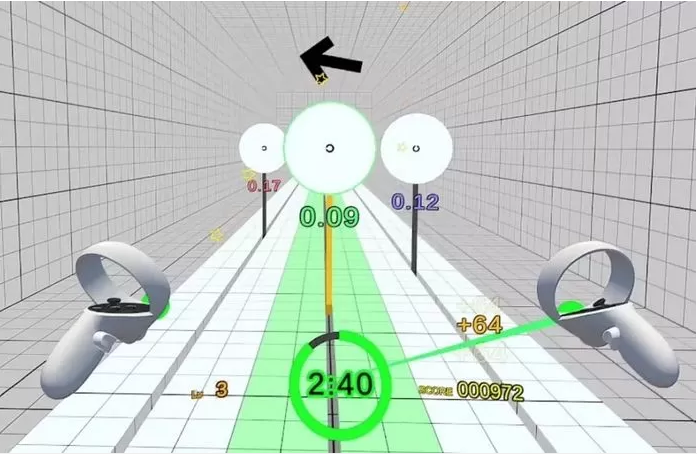Video games and staring at digital screens in general have long been associated with eyesight problems, but according to a study, in certain circumstances, video games can actually help treat short-sightedness.
Japanese researchers from Kwansei Gakuin University’s Graduate School of Science and Engineering have published a small study about a virtual reality video game that can reportedly improve players’ eyesight instead of damaging it. The researchers had a group of 10 people play a very simple VR video game at certain intervals over a period of six weeks to see how it impacted their eyesight. The game used during this study was a relatively simple one that required players to use their VR set controllers to aim and shoot at circular targets that got pushed further back with every successful hit. This repetitive task required players to practice looking at targets both up close and far into the distance in order to beat the game. After analyzing the results, they concluded that even participants who had only played the game at three-day intervals showed measurable eyesight improvements compared to the start of the study.
Doctors have long known that staring at digital screens for a long time can cause a condition known as pseudo-myopia (假性近视), which basically has the same symptoms as myopia, only they are more easily reversible. Pseudo-myopia sufferers can recover through “perspective exercises” and “distance staring”, so researchers created the VR game that incorporated these exercises.
Interestingly, the players exhibiting moderate (中等的) to severe short-sightedness at first showed the most impressive eyesight improvements at the end of the six weeks, whereas those with mild symptoms did not see that much improvement. Researchers believe that this was because the former category suffered from pseudo-myopia, which is easier to reverse, whereas the latter had myopia, which is harder to reverse without surgery or expensive eyeglasses. Researchers now plan to extend their experiments to test the full potential of their VR video game, but even if it works best on pseudo-myopia, it could still help millions of young people who spend most of their time with their eyeballs glued to digital screens improve their eyesight. If left untreated, pseudo-myopia often leads to myopia.
原创编写 版权所有 侵权必究! 每日更新 个性化阅读 英语飙升!
1.1. What was the purpose of the VR game in the study?
A To test VR tech.
B To treat myopia.
C To entertain players.
D To improve eyesight.
解析:选D。细节理解题。根据第二段的“a virtual reality video game that can reportedly improve players’ eyesight”可知,研究中VR游戏的目的是改善视力。故选D。
2.2. What does “reversible” in Paragraph 3 probably mean?
A Permanent.
B Curable.
C Preventable.
D Unchangeable.
解析:选B。词义猜测题。第三段描述假性近视的症状与近视相同但“more easily reversible”,结合后文“Pseudo-myopia sufferers can recover”(假性近视患者可以恢复),可推断“reversible”指“可逆转的”或“可治愈的”。选项B“Curable”最贴近此意。Permanent固定的,Preventable可预防的,Unchangeable不可改变的。故选B。
3.3. Why did moderate to severe shortsighted players improve more?
A They practiced more.
B They used eyeglasses.
C They had pseudo-myopia.
D They liked VR games.
解析:选C。细节理解题。第四段中提到“the players exhibiting moderate to severe short-sightedness at first showed...which is easier to reverse”一开始表现出中度至重度近视的球员在六周后的视力改善最为显著,而那些症状轻微的球员则没有太大改善。研究人员认为,这是因为前者患有假性近视,而假性近视更容易逆转。由此可知,中度至重度近视者改善明显是因为他们多为假性近视,更易恢复。故选C。
4.4. What can we infer about the VR game?
A It needs more tests.
B It’s for all patients.
C It suits myopia best.
D It’s widely used now.
解析:选A。推理判断题。根据最后一段的“Researchers now plan to extend their experiments to test the full potential”可推断,该VR游戏还需更多测试以验证效果。故选A。
